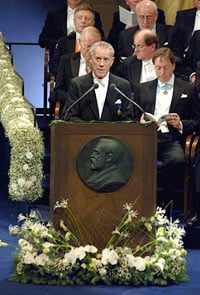Award ceremony speech
English
Presentation Speech by Writer Per Wästberg, Member of the Swedish Academy, Chairman of its Nobel Committee, December 10, 2005.
 |
| Per Wästberg delivering the Presentation Speech for the 2005 Nobel Prize in Literature at the Stockholm Concert Hall. Copyright © Nobel Media AB 2005 Photo: Hans Mehlin |
Your Majesties, Your Royal Highnesses, Esteemed Nobel Laureates, Ladies and Gentlemen,
Harold Pinter is the renewer of English drama in the 20th century. “Pinteresque” is an adjective listed in the Oxford Dictionary. Like Kafka, Proust and Graham Greene he has charted a territory, a Pinterland with a distinct topography.
With his twenty-nine plays and about a hundred that he has directed or acted in, he has made the theatre his own domain. His figures barricade themselves in unpredictable dialogues. Between the lines of unresolved threats, it roils and stings. What we hear are signals for everything we do not hear.
The abyss under chat, the unwillingness to communicate other than superficially, the need to rule and mislead, the suffocating sensation of accidents bubbling under the quotidian, the nervous perception that a dangerous story has been censored – all this vibrates through Pinter’s drama.
His characters are at the mercy of each other on the periphery of life. They are also prisoners in the limbo of class divisions, set phrases and solidified habits. Their identities, backgrounds and histories are vague, and different versions exist depending on who is remembering. They seldom listen to each other but it is precisely their mental deafness that makes us listen. Not a word passes unnoticed, nor can we relax a single minute. Atmospheric pressure fluctuates as secrets unroll and shift the distribution of power.
Memories – invented, manipulated or real – flow as a hot undercurrent through Pinter’s plays. We model the past to respond to the demands of the present and to form our future.
As closed rooms open to an international community, Pinter redefines romantic love as a more resilient love that includes friendship and the exigency to promote justice through action. In Mountain Language, love takes the form of an unconditional generosity missing in his earlier works. To survive, we must do good deeds and stand up for the enslaved in this age of terror and spiralling violence.
It is usually said that Pinter’s political commitment came late. But Pinter himself describes even his first period – The Dumb Waiter, The Birthday Party, The Hothouse – as political. In these “comedies of menace”, language is a weapon of aggression, evasion and torture. The early works can be seen as metaphors for authoritarian intervention on several levels: the power of the state, the power of the family, the power of religion – all undermining the individual’s critical questions. Pinter uncovers the reasons for wanting to destroy the identity of others and the fear disguised as violence against those who stand outside the party, club or nation.
Pinter’s work has neither winners nor losers. In the power game between characters, we seldom know who has the upper hand; they change places, growing and sinking through lines that seldom seem deliberate. The characters have sides invisible to the eye, exposed in the ultraviolet rays of ambiguity. They grope forward between invisible walls and stratify into different levels of reality. In defending themselves against intrusion, they blockade themselves in spaces mined like alien terrain.
Pinter has perforated conventionally realistic drama with taciturnity’s mystery, and has equipped his overblown figures with so many outlets that we can live with the characters and see them age and decay as we do. The solid and impenetrable figures of public life disintegrate in disastrous incoherence. They send messages that never seem to arrive, yet we leave the theatre less righteous than on entering.
For systematists, the world exists to put in order. For Harold Pinter it is for dissembling, through which the good and the humane find a way to seep out through the bureaucratic cage of ingrained reflexes. In a ruthless analysis of the totalitarian, he illuminates the pain of the individual.
Throwaway lines sting, little words corrode, what is half-said crushes, what is tacit forebodes catastrophe. Pinter, the tailor’s son, scissors language, allowing the action to originate from the voices and rhythms of the characters. Thus, there is no given plot. We do not ask: “What will happen next”? Rather, “What is happening”?
The words are instruments of power. Words are repeated until they resemble truth. In a time of over-information, Pinter frees words from describing reality and makes them reality itself, at times poetic, more often oppressive. At the end, it is only through language that we can erase our destiny and recreate it.
Dear Harold Pinter,
In its choice of a Nobel Laureate the Swedish Academy recognises only the creative power of a single individual regardless of nation, sex and literary genre. This needs emphasising. However British you may appear in the eyes of many, your international and inter-human impact in the field of drama has been uniquely strong and inspiring for half a century. If someone thinks your prize is late in coming, we may reply that at any given moment somewhere in the world your plays are reinterpreted by new generations of directors and actors.
In your works, seductively accessible and frighteningly mysterious, the curtain rises on dense life-landscapes and harrowing confinement. In poetic images, you illuminate an existence where fantasy and the nightmare of reality clash.
In the absence of this year’s Nobel Laureate in Literature, I request his publisher Mr. Stephen Page to come forward and receive Mr. Pinter’s Prize from the hands of His Majesty the King.
Nobel Prizes and laureates
Six prizes were awarded for achievements that have conferred the greatest benefit to humankind. The 14 laureates' work and discoveries range from quantum tunnelling to promoting democratic rights.
See them all presented here.
